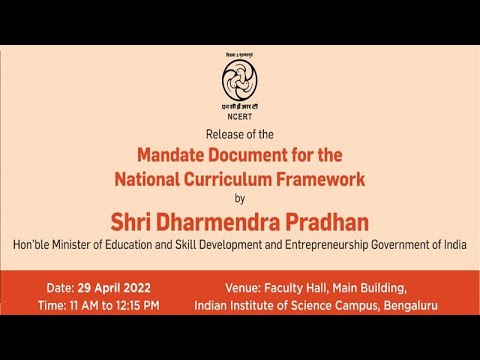Ahmedabad
(Head Office)Address : 506, 3rd EYE THREE (III), Opp. Induben Khakhrawala, Girish Cold Drink Cross Road, CG Road, Navrangpura, Ahmedabad, 380009.
Mobile : 8469231587 / 9586028957
Telephone : 079-40098991
E-mail: dics.upsc@gmail.com

Mandate Document for National Curriculum Framework
News: Recently, the Ministry of Education has released the ‘mandate document’ for a National Curriculum Framework under the new National Education Policy (NEP), 2020.
• The mandate document is envisaged to bring about a paradigm shift with focus on holistic development of children, emphasis on skilling, vital role of teachers, learning in mother tongue, cultural rootedness.
• It is also a step towards decolonization of the Indian education system.
About National Curriculum Framework:
• The development of the NCF is being guided by the National Steering Committee (NSC), chaired by Dr K Kasturirangan, supported by the Mandate Group, along with the National Council for Education Research and Training (NCERT).
• The NCF will include:
• The National Curriculum Framework for School Education (NCFSE),
• The National Curriculum Framework for Early Childhood Care & Education (NCFECCE),
• The National Curriculum Framework for Teacher Education (NCFTE),
• The National Curriculum Framework for Adult Education (NCFAE).
Mandate Document – What is it?
• It sets the mechanisms for the development of a coherent and comprehensive NCF, fully leveraging the widespread consultations already under way.
• The process designed ensures the seamless integration imagined - vertically (across Stages) and horizontally in the NEP 2020 – to ensure holistic, integrated, and multi-disciplinary education.
• It enables the critical linkage between the curriculum of schools with the curriculum of Teacher Education as an integral part of the transformative reforms envisioned by the NEP 2020.
• It informs the creation of opportunities for life-long learning for all citizens in the country.
• Anchored and informed by sound theory and cutting-edge research yet using simple language with real-life illustrations from classrooms and schools in a variety of contexts.
• The states and the Centre ‘must act urgently’ to address the ‘huge learning loss’ among students due to the interruptions in regular teaching and learning caused by the pandemic over the last two years.
What is Decolonization of Indian Education system?
• India has been a colony of the British Empire for two centuries. These eventful two centuries of Indian history did see the influence of not only the political and economic might of Britain but its influence on every milieu of Indian life.
• India’s indigenous education system was gradually displaced, and the colonial model of education pervaded under the patronage from the colonial-state. The language, pedagogy, evaluation and knowledge of the colonizer became natural obligation for the population of the colony.
• Although India got independence in 1947, still Indian education system is heavily dominated by western world. Hence, there is a need to decolonize Indian Education System immediately.

Address : 506, 3rd EYE THREE (III), Opp. Induben Khakhrawala, Girish Cold Drink Cross Road, CG Road, Navrangpura, Ahmedabad, 380009.
Mobile : 8469231587 / 9586028957
Telephone : 079-40098991
E-mail: dics.upsc@gmail.com
Address: A-306, The Landmark, Urjanagar-1, Opp. Spicy Street, Kudasan – Por Road, Kudasan, Gandhinagar – 382421
Mobile : 9723832444 / 9723932444
E-mail: dics.gnagar@gmail.com
Address: 2nd Floor, 9 Shivali Society, L&T Circle, opp. Ratri Bazar, Karelibaugh, Vadodara, 390018
Mobile : 9725692037 / 9725692054
E-mail: dics.vadodara@gmail.com
Address: 403, Raj Victoria, Opp. Pal Walkway, Near Galaxy Circle, Pal, Surat-394510
Mobile : 8401031583 / 8401031587
E-mail: dics.surat@gmail.com
Address: 303,305 K 158 Complex Above Magson, Sindhubhavan Road Ahmedabad-380059
Mobile : 9974751177 / 8469231587
E-mail: dicssbr@gmail.com
Address: 57/17, 2nd Floor, Old Rajinder Nagar Market, Bada Bazaar Marg, Delhi-60
Mobile : 9104830862 / 9104830865
E-mail: dics.newdelhi@gmail.com